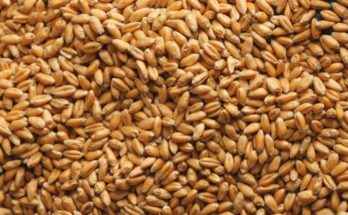Agricultural and Processed Food Products Export Development Authority (APEDA) actively supported the Government in taking the export of agricultural products to US$20.67 billion in 2020-21 from US$0.6 billion in 1986 when it was founded. APEDA also helped expand the export basket to 205 countries. The share of APEDA exports (US$20.67 billion) constituted 49 per cent of overall agri exports in 2020-21 out of which, cereals and fresh horticulture comprised 59 per cent, cereal preparations and miscellaneous processed items 23 per cent and animal products 18 per cent.
The target given to APEDA in the current financial year (2021-22) is US$23.7 billion, out of which more than 70 per cent i.e. US$17.20 billion has been achieved till January 2022, and the remaining target is expected to be completed within the stipulated time period.
In 2018-19, the export of agricultural and processed food products was recorded at USD 19,406 million (Rs 1,35,112 crore). Export value stood at US$20,674 million (Rs 1,53,049 crore) in 2020-21. In the current financial year 2021-22 (April-December), APEDA has exported agricultural and processed food products worth US$17,465 million (Rs 1,29,782crore).
Aiming to take the export of agricultural products to a new level, APEDA promoted IT-enabled activities for ease of doing business in the promotion and development of exports from India. APEDA has undertaken initiatives like a paperless office (re-engineering, digital signatures, electronic payment facility), APEDA mobile app, phase-wise delivery of online services, monitoring and evaluation, uniform access, and virtual trade fair to make governance more efficient and effective.
APEDA has been focusing on the promotion of exports of locally sourced Geographical Indications (GI)-tagged as well as indigenous, ethnic agricultural products. New products and new export destinations have been identified and accordingly, the trial shipments have been facilitated.
As on date, there are 417 registered GI-products and out of them, around 150 GI-tagged products are agricultural and food. Out of which more than 100 registered GI products fall under the category of APEDA scheduled products (cereals, fresh fruits and vegetables, processed products, among others).
You may also like to read: India secures USDA approval for exporting mangoes to USA in 2022 season
In 2020-21 and in the current fiscal, some of ethnic and GI tagged products exported by India include dragon fruit, patented village rice, jackfruit, jamun, Burmese grapes, dehydrated mahua flowers, puffed rice. GI varieties of mango, GI tagged shahi litchi, Bhalia wheat, Madurai malli, Mihidana, Sitabhog, Dahanu Gholvad sapota, Jalgaon banana, Vazhakulam pineapple and Marayoor jiggery.
The implementation of revamped Agriculture Export Policy is also in the final stage as 21 states and two UTs (Ladakh A&N Islands) have already finalised the state-specific action plans. Those states which have specific action plans are Maharashtra, Uttar Pradesh, Kerala, Nagaland, Tamil Nadu, Assam, Punjab, Karnataka, Gujarat, Rajasthan, Andhra Pradesh, Telangana, Manipur, Sikkim, Uttarakhand, Madhya Pradesh, Mizoram, Meghalaya, Tripura, Arunachal Pradesh and Himachal Pradesh. The action plans of the remaining seven states are at different stages of finalisation.
Country specific agri-export strategy reports have been prepared for 60 countries in consultation with the Indian embassies and high commissions of the respective countries to tap the opportunities emerging during the Covid-19 pandemic and the potential for agri exports to countries.
In coordination with the Government of India’s thrust on ensuring ‘ease of doing business’, APEDA is working with the state governments for ensuring traceability and market linkages for farmers for promoting exports. APEDA’s thrust has been on ensuring digitalisation of land records and formalisation of tenancy for the farmers, which helps in boosting exports.
A Market Intelligence Cell has been constituted in APEDA and the activity of dissemination of e-market intelligence reports comprising detailed market analysis has commenced.
You may also like to read: Indian Railways flags off 1000th trip of Kisan Rail for transportation of agri produce
A Farmer Connect Portal has also been set up by APEDA on its website for providing a platform for farmer producers organisations (FPOs) or farmer producer companies (FPCs), cooperatives to interact with exporters. Around 3,295 FPOs/FPCs and 3,315 exporters have been registered in the portal so far.
“The visionary approach, aggressive and consistent efforts of APEDA have enabled India to position itself as a consistent and quality supplier of agri products,” Dr. M. Angamuthu, Chairman, APEDA said during the 36th foundation day of the authority on Sunday.
For promoting the use of hybrid technology, APEDA has integrated a blockchain solution into its GrapeNet traceability platform. The GrapeNet is a web-based certification and traceability software system for monitoring fresh grapes exported from India to the European Union. The blockchain solution, called APEDA Trust Chain, helps track all the details of the export consignment, right down to the location of the vineyards.
Working in collaboration with the Ministry of Commerce & Industry, APEDA has taken a giant leap in making landlocked Purvanchal (eastern Uttar Pradesh) a new destination of agri export activities by developing Varanasi Agri – Export Hub.
After the intervention of APEDA, Varanasi region has recorded exemplary changes in the agri exports scenario and registered many first-of-its-kind achievements in a very short span of time as about 20,000 tonnes of agri produce have been exported from the Purvanchal region in the last six months.
“Notwithstanding several logistical challenges faced in the global trade of commodities, India’s agricultural and processed food exports have grown at a steady pace in the last decade,” said Dr. M. Angamuthu
Roadblocks for horticultural products exports
Even though India is the biggest producer of main agricultural crops, fruits and vegetables, the country’s contribution to the agri-exports in the global market is not significant due to lack of requisite infrastructure at farm-gate, post-production and logistics complied with other aspects such as awareness about the good agricultural practices, good manufacturing practices, hygienically producing and other latest international standards in the area of quality and packaging have been the key hindrances in harnessing the export potential of the country.





